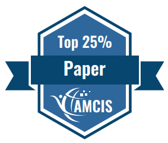Digital technology for the Indigenous, of the Indigenous, and by the Indigenous
Paper Type
Complete
Paper Number
1537
Description
Theories used in the Information Systems (IS) field come in large majority from authors based in Western countries, a bias that holds for critical theories as well. Such a bias is made more problematic by the mandate of critical theory, which is meant exactly to illuminate the oppressive and alienating conditions of the status quo. Against this backdrop, this paper explores the subaltern theory approach by Guha and Spivak (1988) as a theory that, by proposing a socially and geographically connotated narration of “history from below”, can play a major role in the effort to decolonise critical theory in IS. By positioning subaltern theory within the landscape of Indigenous theories, the paper offers an alternative to the Western hegemony of critical theories of IS, exploring the potential of such an alternative to voice marginalised perspectives.
Recommended Citation
Masiero, Silvia, "Decolonising Critical Theory in Information Systems: A Subaltern Approach" (2021). AMCIS 2021 Proceedings. 1.
https://aisel.aisnet.org/amcis2021/digital_tech_indigenous/digital_tech_indigenous/1
Decolonising Critical Theory in Information Systems: A Subaltern Approach
Theories used in the Information Systems (IS) field come in large majority from authors based in Western countries, a bias that holds for critical theories as well. Such a bias is made more problematic by the mandate of critical theory, which is meant exactly to illuminate the oppressive and alienating conditions of the status quo. Against this backdrop, this paper explores the subaltern theory approach by Guha and Spivak (1988) as a theory that, by proposing a socially and geographically connotated narration of “history from below”, can play a major role in the effort to decolonise critical theory in IS. By positioning subaltern theory within the landscape of Indigenous theories, the paper offers an alternative to the Western hegemony of critical theories of IS, exploring the potential of such an alternative to voice marginalised perspectives.
When commenting on articles, please be friendly, welcoming, respectful and abide by the AIS eLibrary Discussion Thread Code of Conduct posted here.



